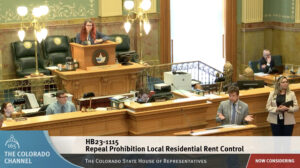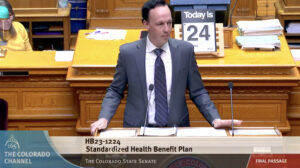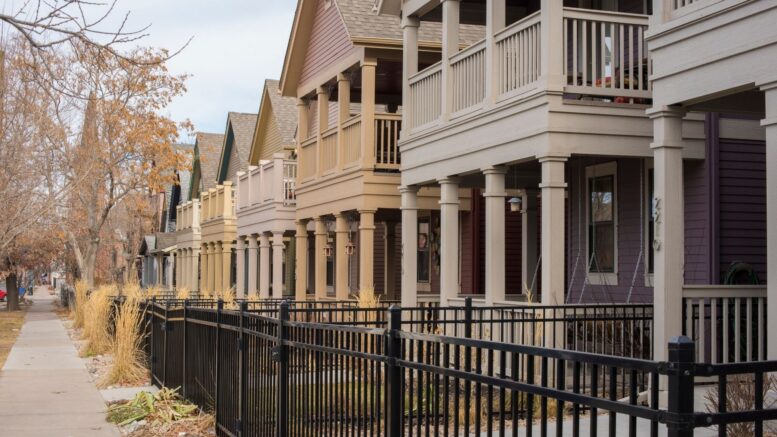A Colorado Senate committee on Tuesday night killed what arguably was the most controversial bill among this year’s sprawling array of housing measures — a proposal that would have allowed local governments to implement rent-control and rent-stabilization measures.
Passed by the House on a largely partisan 40-24 vote in late February, House Bill 1115 faced a long road in the more centrist Senate, where it sat for more than a month before getting a committee assignment. The Senate Local Government and Housing Committee decided on a 4-3 vote that it was not the right solution to the affordability crisis in Colorado, where reports have estimated the state needs more than 117,000 new units to meet needs and where one-quarter of the state’s residents put 30% or more of their income to housing.
HB 1115 would not have implemented a specific rent-control policy but would have dropped the 42-year-old statewide prohibition on cities and counties limiting growth of rents. It only would have applied to rental units at least 15 years old and would have barred local governments from setting rent-hike caps below the total cost of the consumer price index plus 3%.

Colorado state Reps. Javier Mabrey and Elizabeth Velasco discuss their bill to allow local governments to implement rent-control measures on the House floor in February.
Backing from local governments
Some city and county leaders testified for the proposal, saying that they need more tools to counter rising rents that are making their communities less affordable and leaving everyone from service-industry workers to teachers unable to find housing near their workplaces. A litany of renters, including several senior citizens, also came to the committee asking it to give their local governments an option that could help to keep them in units that accommodate their fixed income levels.
“It’s a tool. Like inclusionary zoning, it’s not going to be used everywhere,” said Carbondale Trustee Colin Laird, whose community passed a law 20 years ago that 20% of newly built residences be income-capped but has been able to do little about skyrocketing rents. “But it could be a useful tool in our toolbox to try to preserve affordable housing.”
But business groups, developers and landlords all warned that the bill could have the opposite effect of its intent, pointing to studies of cities like San Francisco that have implemented rent control and then witnessed the supply of new rental units dwindle significantly.
Downsides of rent control
Andrew Hamrick, senior vice president of government affairs for the Colorado Apartment Association, said rent control discourages development of new housing and causes property owners to convert long-term rental housing into other uses such as short-term rentals. Officials of all ideological stripes are pushing for new housing to be built as they recognize that demand is outpacing availability, he said.
“Rent control constricts supply at a time when it is most needed to address unaffordability,” added Anneliese Steel, senior director of public affairs for Colorado Concern. “Rent control is not the right direction for our state.”

Colorado state Sen. Dylan Roberts speaks on the Senate floor earlier this month.
Those arguments seemed to impact Sen. Dylan Roberts, the Avon Democrat who was the decisive vote to kill a previous bill in the committee that opponents said would have limited the metro districts responsible for most of the new single-family housing in the Denver area. Roberts again was the decisive vote Tuesday, saying rent control could speed the conversion of existing long-term rental units into vacation rentals and, while helping some people in towns that implemented it, might drive up rents in surrounding towns and hurt more people.
“I firmly agree and see every day in our district that housing is at a crisis level. Rents are too high. But I’m frankly of the belief that one of the reasons why rent is too high, why we have an affordability crisis, is because we don’t have enough housing stock in Colorado,” Roberts said before joining with Republicans on the committee to vote against the bill. “I think I’ve become convinced that rent control, even in a local manner like this, could and would stifle development, particularly for these large multifamily housing projects that we need.”
Other housing proposals
HB 1115 was one of many bills that majority Democrats have put forward to address rising rental rates, but it was the first significant bill among them to fail. Other measures still moving through the Legislature include bills to limit reasons why a tenant can be evicted, limit the salary that landlords can require prospective tenants to earn and give local governments right of first refusal on apartment complexes that go up for sale.
Those proposals come in addition to a wide-reaching bill proposed by Gov. Jared Polis that seeks to remove local obstacles to the construction of multifamily housing along high-traffic corridors, allow most property owners to build accessory dwelling units and require a first-of-its-kind statewide housing assessment. However, the Denver Post reported Tuesday that the proposal, Senate Bill 213, is about to get pared back significantly to eliminate all its provisions that would override local control of land use and concentrate instead on studying the housing shortage.
Yet another proposal, House Bill 1189, would offer tax credits to employers who contribute to savings accounts of employees looking to purchase a home. However, that bill, which passed its first committee on Feb. 27 with bipartisan support, remains waiting for a hearing in the House Appropriations Committee, leaving its status very much in limbo.
